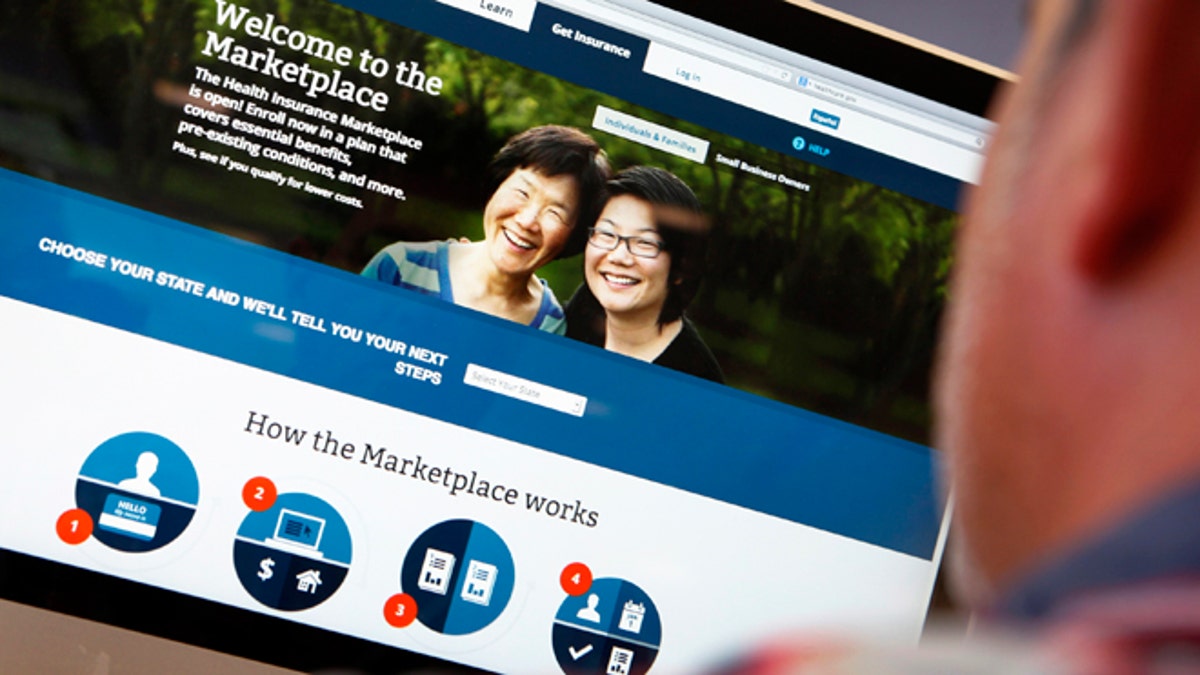
Oct. 2, 2013:A man looks over the Affordable Care Act (commonly known as Obamacare) signup page on the HealthCare.gov website in New York. (Reuters)
New concerns are being raised about so-called ObamaCare "navigators" following a string of reports about the questionable backgrounds of those selected to guide Americans through what is shaping up to be a rocky roll-out of the health care law.
The concerns come on top of the drama over the HealthCare.gov site itself, which is the main federal hub for would-be participants and has been riddled with technical problems. The "navigators" are outreach workers, funded by federal taxpayer dollars, who are supposed to help people sign up for coverage.
The Daily Caller reported earlier this week that one "enrollment assister" in Lawrence, Kan., had an outstanding warrant for her arrest as well as a troubled financial history. The Heartland Community Health Care Center, where she works, later confirmed to the Caller that she had a bench warrant for an "unpaid medical debt" -- but had been unaware of the warrant. The group said she worked with the courts to satisfy it, and the warrant is "no longer active."
Still, the incident raised questions about the background check process, and spurred Kansas state Sen. Mary Pilcher-Cook to push legislation increasing oversight on those assisting the public with enrolling in the exchanges. Her bill would require background checks and licensing for anybody doing that work in Kansas.
"We need to give assurance to Kansans that as the reams of Obamacare regulations continue to roll down from Washington D.C., we will be working with our colleagues to find solutions that will help shield the people of Kansas from the worst aspects of this broad government overreach," she said in a statement.
Other reports have emerged about navigators playing an active role in advocacy for illegal immigrants.
The Caller reported Thursday that another Kansas navigator was part of a protest earlier this year at Kansas Secretary of State Kris Kobach's property. Kobach has been heavily involved in state-level efforts to strengthen immigration law.
He told Megyn Kelly Friday night on "the Kelly File" that it was "crazy" to pay her to be a navigator.
"It crosses the line when you go to someone's home and attempt to intimidate them," he said. "Now someone engaged in that kind of tactic is getting taxpayer money to implement ObamaCare."
The Center for Immigration Studies also found that an illegal immigrant from Peru, who is part of a union-tied New York group, is working as a navigator in that state.
The navigator, Maria Marroquin, though, is also an in-the-open advocate of DREAM Act policies to let illegal immigrants who came to the U.S. as children stay.
According to an Associated Press story last year, Marroquin came to the U.S. from Peru when she was 13 and later founded the group Dream Activist Pennsylvania. She was among many who signed up for a reprieve via the administration's DREAM Act-style directive last year.
FoxNews.com also reported earlier this week that a group formed from the ruins of ACORN is working as part of a multi-state navigator drive to help people enroll in the health program.
The United Labor Unions Council Local 100, a New Orleans-based nonprofit, was established by ACORN founder Wade Rathke after his larger group was broken up amid scandal in 2009 and banned from receiving taxpayer funds.
"At a time when our government has ceased functioning due to an appropriations gap, it is ironic that America's tax dollars are being doled out to an entity whose poor stewardship of our funds was well-established by Congress," said Dan Epstein, executive director of Cause of Action, a nonpartisan watchdog group based in Washington.
The Obama administration in August awarded $67 million to dozens of ObamaCare navigators.
Amid the ramp-up, state attorneys general have raised concern about the screening process for hiring the workers. Thirteen attorneys general warned in an August letter to Health and Human Services Secretary Kathleen Sebelius that training and safeguards in place for the navigators may be inadequate.
They said the background check system "pales in comparison" to what is typically required for workers in programs receiving federal health dollars.
"It is not enough simply to adopt vague policies against fraud," they wrote.




